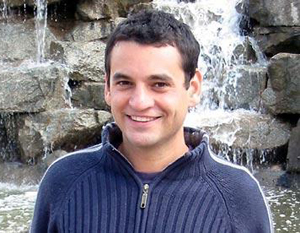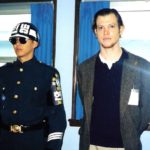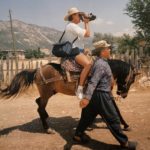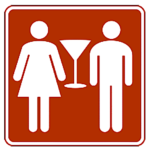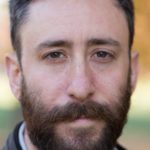Tony D’Souza is the author of the novel Whiteman (Harcourt, 2006), which was a New York Times Editor’s Pick, People Magazine Critic’s Choice, Poets & Writers Best First Fiction, and Border’s Original Voices Selection. A graduate of Notre Dame, he served a two-year Peace Corps stint in Cote d’Ivoire. His writing has appeared in The New Yorker, Playboy, Salon.com, Esquire, Tin House, McSweeney’s, O. Henry Prize Stories, and The Black Warrior Review. His second novel, The Konkans, releases in October of 2007.
How did you get started traveling?
I loved Chicago, but I was a reader, I read My Side of the Mountain, Jack London, Huck Finn
, Kipling, I got these ideas. I worked at McDonald’s, saved money. I told my folks and friends that I was leaving right after high school, that I was going to Alaska. Everybody laughed. I bought a tent from Walgreens, a Raleigh mountain bike, a Coleman single burner, and REI boots and panniers. I got a sub-zero sleeping bag and bed roll. I bought it all little by little my senior year. I practiced putting up the tent in my room, lighting the stove on the sidewalk. I rode my bicycle 1200 miles alone that summer across Alaska. I’d just turned 18.
I’d had to box the bicycle up for the plane, in the Anchorage Airport, I looked around me. There was a big Japanese tour group, each wearing the same blue and red baseball cap. I wanted to cry. What was I doing? Then my things started coming along the luggage belt, and I unboxed the bike, began to put it together. I’d taken it apart and put it back together dozens of times. Then my backpack came — I rode that whole trip wearing an external frame backpack — the rest of my gear. I got on the bike, cycled out of the airport and along the highway in the rain. A few days in a hostel let me calm myself, the older kids there, cannery workers, were really nice to me, got me drunk, I had a good time. I got bear bells for my boots, I set out. The first night camping rough, I didn’t sleep, I sat up holding my knife. Everything was a bear, a wolf, or worst of all, people. The next night wasn’t as bad, and on and on until I spent two weeks in the backcountry near Denali, living off blue berries, having long conversations with moose. My grandmother died while I was away. Even the State Troopers couldn’t find me. In the end, Alaska was the perfect place to start. There weren’t a lot of people around, and the nights were only four hours long. A later ride across Europe was more about hiding out in city parks and getting chased by dogs.
You’d think I’d be a cycling fanatic, but for me it’s just a cheap way to get around. Since Alaska, I’ve done five more long rides like that, cutting down on gear each and every time. My most recent was last year when I rode 350 miles from Phoenix to the Grand Canyon, climbed down into the Canyon for some time, then crossed the Navajo and Hopi Reservations on a $50 one-speed beach cruiser carrying little more than a sleeping bag, some warm clothes, a toothbrush, water, sardines, bread and matches in January. My favorite was when I rode a one-speed Chinese bicycle 700 miles through Cote d’Ivoire carrying nothing more than a bed sheet, a clean change of clothes, my toothbrush, cigarettes, and some money. I drank water from wells and slept in villages.
How did you get started writing?
I had always been a reader, so I was ready. I went to college at a small liberal arts college in Wisconsin to calm my parents, this was right after Alaska, I was miserable in my dorm room after having Alaska to myself. A teacher gave me Hemingway’s In Our Time. The story “Soldier’s Home” in it, that was it. I was going to be a writer after that or nothing. That story so captured my malaise. It was like I suddenly understood myself. Ah, it’s worth all the sacred texts of the world to me, what that six-page story did for me then. After that, it’s always felt like a responsibility to me, to tell stories. My early fiction was really dark. Then the war in Cote d’Ivoire introduced me to truly dark things, and it became too much. I’ve sought out humor and lightened my palette since. It’s a better balance for me.
So Hemingway was my biggest early influence. But I also find my roots in Conrad, London, Twain, and to a certain extent Faulkner and Waugh, and before them in Chaucer, Cervantes, Voltaire, and later in Carver and Tim O’Brien, people like Saramago, Coetzee, Cormac McCarthy, Calvino, Marquez, Mishima, Cabrera Infante, Hwang Sun Won. I learned a lot from Eudora Welty’s story “Powerhouse.” I read and read. I read poetry for simple pleasure and to keep my ear tuned and language accurate. I love Clifton, Bishop, Stevens, Yeats, Frost, Roethke, Levertov, Olds, Gywnn, Addonizio, the French, the Germans, the Hungarians, Neruda, Cold Mountain. My favorite work of any sort is Gilgamesh
.
What do you consider your first “break” as a writer?
My big break as a writer happened when I was 22 holed up in a small room in the old Russian military barracks in Prague. My father had recently died, and while I’d begun to tell people I wanted to be a writer after that Hemingway story, my father’s death gave me both the freedom to actually pursue writing, and the whip at my back urging me on. If he had lived, I would be a lawyer. So his death gave me freedom not in a financial sense, but psychological freedom to pursue art with the necessary determination. Because there were a lot of race related issues that I never got time to deal with. Race as much as anything led me to leave home and stay away and live in exile. It was always easier to pass myself off as Italian than to get into the racial makeup of my family. Because it closed doors for me definitely, girls, friends, people’s parents, Italian was manageable, Hindu was not. Even though we were Catholic. It was the color pure and simple. My father was very dark.
So I felt like Judas because of my denial of my race and father, and do still. After he died, I sought refuge with an old girlfriend in Stockholm. That was okay at first, then she threw me out. We had an argument about Orpheus. I said he looked back out of love, she said that was a chauvinistic reading. I heard John Gardner tried to kill his wife in an argument over who was the greater writer, Melville or Hawthorne. I understand that. (Gardner’s right, it’s Melville.)
But I managed to speed through college in five semester, taking a BA when I was 20, so when he died, I’d been away again working fishing boats and construction in Scotland and Germany for nearly two years. I had this dream in my bunk one night in Oban, Scotland, of my grandfather, long dead, telling me to go home, I did, my father and I had this long conversation one night that made us both feel good, he died two days later, a massive heart attack.
Anyway, I get kicked out of Stockholm and I’m almost broke, I go to Prague. A different girlfriend agrees to put me up in Paris, but I have to wait until her dance troupe comes back from the south of France a month later, in August. So Prague was a cheap place in ’97, I lived in that cell of a room and wrote everyday. I’d been writing more or less everyday for a year at this point. One night after a big bender on absinthe at the Globe bookstore, I woke up covered in mud in my bed somehow with the worst hangover I have ever had, or will ever have. A day into it, I managed to crawl downstairs for water and bread. Then I sat down to do my writing, and the Muse visited me for the first time.
It’s just different, wholly different, writing inhabited by the Muse. Something you didn’t understand becomes crystal clear. My writing process in my fiction was established that day. I write everyday and hope for the Muse. If she doesn’t come, I throw that day’s work away. I’ve published stories that have very little Muse in them. But I don’t love them and neither do most readers. I don’t worry about getting the Muse in my non-fiction, which for me is something else, and, frankly, easier. I get the Muse once or twice a year, when I was writing Whiteman and then The Konkans, it was night after night for weeks on end. I’m miserable without it. But there is nothing I can do but keep my discipline and pray.
That first story was a page and a half long. I understood that it was good, and that it didn’t really belong to me. I knew I was a writer at the end of it. That was my big break. The story is titled “Young.” I wrote it ten years ago. Feels like a few minutes ago.
As a traveler and fact/story gatherer, what is your biggest challenge on the road?
My biggest challenge on the road is language. I speak eight, ten of them, some of them very well, some of them I slip on and off like shirts. It’s also the best part of traveling. Because the world is about people. I do go up into the mountains alone, I know a place in the Siskiyou Mountains of far Northern California where I like to go down this valley for four, five days, a week. Nobody is there besides me, it’s never been logged, no development, it’s on a branch of the McCloud River. I take some fishing line, a sling shot, I eat miner’s lettuce in the spring, black berries and currants in the fall, squirrels, trout. I build a fire at night, sometimes I eat mushrooms, other times, not. Then I sit there and try to get a grip on everything that has happened.
But it’s language, a challenge to learn every time, always worth it. In my memories, I can never remember what languages we were speaking when we were having those good/bad/scary/funny times in the souk/bar/bunker/bedroom. If I had a choice of a super power, it would be to speak every language.
If anything now, I wish there were more languages, more sexes, more races, more of it all. Time and youth especially. I wish there was a blue race of people. I’d like to marry a navy blue girl. Because you know that everyone would say that the powder blue chicks were the best, but it wouldn’t be true, the navy blue girls would be just as pretty.
What is your biggest challenge in the research and writing process?
My biggest challenge is finding a place to write. Lots of times I’m in the non-literate world and people get wierded out when you sit in your hut or house all day. They think you’re up to something, witchcraft (and I think that, pretty much, that’s what it in fact is). It was the most difficult thing I faced in my years in that village in Africa. People were always sitting in my doorway, watching me write. I write with a pen and loose leaf paper. I’ve learned how to write using footstools for tables, standing at bars, recently on tour, in hotel rooms of all sorts, on airplanes. I’m very used to it now. But while I was writing Whiteman, I had a continuous habitation in the Siskiyou Mountains, and I much prefer that. A table at a window with a view of the night, a Miller Lite, a cigarette. It’s not going to happen again for years because of commitments I have, but I like the idea of that. I lived in that place for 18 months. After that, I think it’s health. I feel charged right now to get a lot of work done. I know Saramago didn’t get started until he was 60. I’m not counting on having this sort of energy then.
What is your biggest challenge from a business standpoint? Editors? Finances? Promotion?
I have a great team between my publishers and agencies. I have no concerns on the publication/editing/promotion end. I even have enough money, all of which I earned through writing. It will last three or more years, knock on wood, even if nothing else comes in. I will spend it all on writing and then see where I’m at. I’m not married, have no debts or kids, and I live like a student. But I like living like a student. I have not had a bad experience in the publishing world. But that is a lot because of choices I’ve made. My agent didn’t want my first book. Okay, I put it away and wrote Whiteman. The first book wasn’t good. If she hadn’t wanted Whiteman, then I would have had a problem. But she wanted it. The Mail on Sunday in the UK jerked me around for months this summer on a essay they kept having me re-write, and then they killed it. Whiteman didn’t get released in the major bookstore chain in Canada. Sure, each thing like that can ruin your day if you let it. But years of rejection in the small presses got me ready for anything; I just let the negative stuff go and press on. Now I’d like to see my many, many published internationally award winning short stories get collected. Once in a blue moon I’ve been known to say to my agent, my editor, “Hey, how about a collection of my many published internationally award-winning short stories?” No response. Then my serials, Michele Mortimer, the one who always tells me the truth, she said to me, “Forget the stories.” Ten years of work. So I forgot the stories. Then she said, “And don’t write about yourself again.” My major subject. OK. So I wrote my new book The Konkans instead. And she was right on both counts.
The only thing I have ever worried about was the writing, because it was the only thing I felt I could somewhat control: how well I maintained my discipline, how high I set the bar on myself. The rest of it, you can be smart about things, but it’s out of your hands. In my MFA, the first question one of the fellow students asked the teacher was, “How do I get an agent?” None of us had books to sell. Not even her. Forget about all of it, the writing is and always will be the hard part.
Practical things: I set up my own website, it’s been immeasurably helpful. I set up half of my 25 city tour. The dates I arranged were mostly better than the publisher’s events. Every time I’m solicited for a piece of writing, I do it. In the meantime, I’m always thinking of pitches to different places that will be a natural part of my body of work.
Have you ever done other work to make ends meet?
I’ve been writing full time for going on two years. I wrote Whiteman while teaching a 4/4 load of Composition at a community college. I adjuncted for a year before that. I was in the Peace Corps for three years. I was in grad school for two and a half years on scholarship/fellowship. I’ve worked construction, fishing, restaurants, fast food, even petty pushing back in the day. I worked on an avocado farm in Israel for some reason. My mother has helped me out in pinches. I once won almost a whole year’s Peace Corps salary playing roulette in Abidjan ($3000) when my number, 18, came up three times in five spins and I was drunk enough to load it the second two times and somehow had the sense to walk away, a roll of West Africa francs as big as a softball hidden in my sock. Then I made more money the next day trading that money at a great rate for dollars with an American business tourist.
Friends and girlfriends have put me up all over the world. I’ve mostly lived student poor, not real poor. For most of my adult life, my Social Security form says I made no money at all. If I have to work again, then I will. Right now I don’t have to work. I’m also busier than I have ever been. I’m not worried about money right now. As I write this I realize that I’m not worried about money for a change. What a feeling. It’s like this big, cluttered, packed closet is suddenly clean and empty. Let me go out and celebrate by buying nothing. That said, when I’m in New York and London or anywhere with friends, I can hemorrhage money with the best of them. What did I pay for my studio apartment in central London this summer? $2800 a month? I sure did. My rent now in Nicaragua is $1500. A year. For a house. On the beach. I day traded penny stocks on the internet for a month last year. My trading house made a cool $5000 in fees off me. I lost $1800. I have very cheap, catastrophic-only health insurance. I’m still getting used to not having any income for months. I’ve read an inordinate amount of material on tax laws. Things are working out.
What travel authors or books — fiction and nonfiction alike — might you recommend and/or have influenced you?
I really liked Wade Davis’ One River, Chris Camuto’s In Another Country
. I like Bill Bryson, despite myself, it’s just always such an easy read, like drinking wine coolers. Hessler is a great writer. I wish he’d work some sex into his next book. I like Twain’s travel books. Steinbeck. De Tocqueville. I’m a disciple of Moritz Thomasen. He really gets it about travel writing, that it’s not really about traveling. Because the places change so quick, the moments are already gone. Chris Baker owns Cuba. Lucky guy. P.F. Kluge is a literary travel writer, and pretty funny. He can write up the sexy Micronesian women. I am sick of ‘trip to Iraq’ books. Everybody’s cashing in on the war. That said, I heard Rory Stewart’s books were good. I wish more Japanese travel writers would get translated because the few things I’ve read, I don’t remember names or titles, they’re funny. Hunter Thompson is flawless in Shark Hunt
. Lewis and Clark and all their misspellings. Cabeza Da Vaca has a great description of a hurricane from when Europeans didn’t even have a name for them. I reread Thor Heyerdahl’s Kon-Tiki
a few times as a kid. Burton can be such a tough, long, dry read. But that Victorian lady who traveled all over Africa with her umbrella, she’s great. Bukowski writing on his trip to Texas is funny. Travel writing is character writing. Bryson is always Bryson, Twain, Twain. I like the journals of those 16th century Portuguese sailors who got stranded all over the Indian Ocean. I’m sure Dafoe read those. I like the Icelandic sagas as travel writing. Exodus. The Odyssey. Elizabeth Bishop is a great travel poet. George Orwell in Down and Out
.
What advice and/or warnings would you give to someone who is considering going into writing?
You need not wonder if you are a writer or not. Writing will come and get you. Writing will touch you with its black finger and you’ll carry its curse like the bells the lepers in Medieval Europe wore around their necks so that they might never again enjoy the warm touch of human contact.
Then it will be years or decades or a whole lifetime of hard labor filled with constant rejection and sometimes open ridicule from your closest friends, your parents, partners will leave you for richer partners, a girl will say to you, “I don’t want to live on faculty row,” and in a fight another girl will say, “You’re not a real writer,” and then all the morons you grew up with will be millionaires and you’ll finally have a short story accepted in a literary journal that will then immediately go out of business. Meanwhile, The Da Vinci Code will sell 40 million copies.
But it’s waiting there, the paper, the pen. It’s a puzzle you have to finish. You’ll spend a whole day thinking about the word ‘stone’. You’ll rewrite the sentence you want that word to inhabit for a week. Something will come into you as you hunch over that paper, you’re hand will move in the light under your lamp, the world will be asleep, a sentence will glitter on that paper, it will have the word ‘stone’ in it three times, and when you read it again, you know nobody will ever notice but you. Because a story is happening now and the words have disappeared. You’ll feel the presence of someone behind you, you’ll turn and look. Nobody will be there. Then you’ll turn to the paper again to find the next line. Is this act good or bad? Does it even make you happy? You’ll never know. You’re a watchmaker, a tinker, a freak in his attic, myopic as a mole. Your life will be this one thing. And one day, they might even want what you’re making.
What is the biggest reward of life as a traveler and writer?
Once in a while someone who’s writing you grew up reading will send an e-mail out of the blue that says, “I’ve been reading you.” I like the artwork that some of my work has inspired or been associated with. I buy the paintings I can afford. I look at them and I think ‘Wow, wow’. Fan mail is satisfying. Hate mail makes me drink. Writing has neither been fun nor easy. The very best thing is not having given up.

